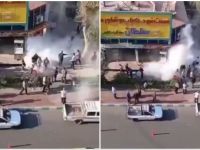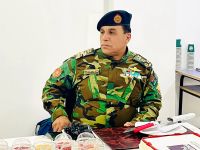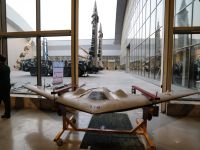Militia incursions into East Timor are easing and most infiltrators have returned to their bases in Indonesia-ruled West Timor, UN peacekeepers in this southern border town said Monday.
Suai, 110 kilometers (68 miles) southwest of the capital Dili and 20 kilometers (12.4 miles) east of the border, has borne the brunt of attacks in recent months by pro-Jakarta East Timorese militia once trained and backed by Indonesia's military.
Two peacekeepers were killed in separate militia attacks within a 20-kilometer radius of the town in July and August. Since then, peacekeepers have clashed with militia inside East Timor six times, killing five.
But after months of incursions and infiltrations, Suai and the surrounding district of Covalima is now secure, Operations Commander Major Roger Noble told a visiting UN Security Council delegation.
"There has been no more deliberate attacks against PKF (peacekeepers) posts, the exfiltration into West Timor is largely complete ... and we have had a downward slide in militia activity," Major Noble told the seven Security Council envoys.
"Security is stable in the area."
However, he added, it was possible that some militia remained in the half-island territory's central districts.
Militia gangs began stepping up activity against the peacekeepers last May, attacking their posts just inside the border twice with grenades, and infiltrating the territory, Noble said.
From June to August "we saw a high tempo of militia operations," he said.
"Throughout August ... we saw upwards of 50-plus militia, heavily armed, traipsing through to sector central," he recounted, referring to the peacekeeping zone in central East Timor.
"Those groups subsequently moved into sector central where they attempted to link up with family ... and attempted to establish an influence there.
"At the end of September, for whatever reason, they began to exfiltrate back towards West Timor and they largely followed the routes they'd come in through."
New Zealand troops intercepted the exfiltrators and killed three of them, all armed, in separate clashes between September 26 and October 24, Noble said.
"(Since August) we have seen a drop-off in the frequency of militia activity," Noble told journalists after briefing the delegation.
A resolution passed by the Security Council in early September intensified pressure on Indonesia to rein in the militia attacks, demanding among others, that it "prevent cross-border incursions into East Timor."
The resolution followed the slaughter of three UN refugee workers by a frenzied militia mob in the West Timor border town of Atambua, and the subsequent exodus of 400 foreign and local aid workers.
Signals of an erosion in relations between Indonesia's military and the militias, who they have nurtured over two decades, have emerged since then.
Soldiers and militia clashed last month, one group of militia leaders have publicly denounced the military and accused its officers of plotting to kill them, and there has been an increase in military-assisted returns of refugees in the face of militia opposition.
Notorious militia chief Eurico Guterres has been under arrest for more than one month on charges of inciting resistance against the authorities.
Noble however refused to conclude that militia activity had ceased for good or had wound down because of efforts by the Indonesian military.
"Militia reports continue in both the north and south and we maintain vigilant and constant operations throughout this sector to detect and then counter it," Noble concluded to the delegation.
The militia gangs fled over the border in September last year as international troops arrived to secure the territory, razed by a militia-led scorched earth campaign in response to the territory's vote for independence.
Returnees from refugee camps there say they continue to intimidate thousands of stranded refugees from going home, and spread misinformation about conditions in East Timor -- SUAI, East Timor (AFP)
© 2000 Al Bawaba (www.albawaba.com)







